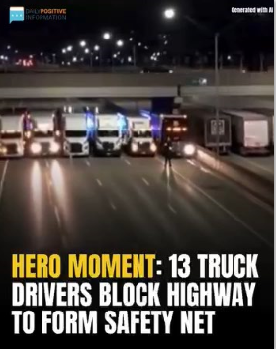
Sometimes, those experiences make it feel like the world is getting darker — like people are becoming more distant, more self-centered, less empathetic. And in a time when headlines are often filled with negativity, it’s easy to believe that compassion is becoming rare.
But then, something happens — a single moment, a powerful story — that renews our faith in humanity. That reminds us that there are still good people out there, willing to help complete strangers without expecting anything in return. One such story took place on Interstate 696, beneath a highway overpass in Huntington Woods, Michigan — and it has since touched the hearts of millions around the world. A Normal Day Takes a Sudden Turn. It started like any other day. People were on their way to work, school, or home. The highway was busy, filled with the daily rhythm of honking horns and moving engines. But that rhythm was suddenly and unexpectedly broken.
Traffic came to a sudden halt. Cars stopped. Engines were turned off. Time seemed to freeze. Confusion spread quickly, and frustration followed. People started to get angry, as they often do when stuck in traffic. No one likes to sit still for hours, especially on a busy highway with no explanation. What the drivers didn’t know yet was that something very serious — something deeply human — was unfolding just above them.
Michigan State Police Trooper Michael Shaw had received a distress call. A man was seen standing on the edge of an overpass bridge, contemplating suicide. It was a heartbreaking situation, but unfortunately not an uncommon one. Mental health crises are a silent epidemic, often hidden in plain sight.
As first responders rushed to the scene, the priority was clear: protect the man’s life at all costs. Negotiators were called. Traffic was diverted. But time was running out, and the risk was high. The fall from the overpass would almost certainly be fatal.
That’s when Trooper Shaw had an idea — simple, yet brilliant. If they couldn’t immediately convince the man to step back, maybe they could at least make the fall survivable.
Shaw quickly contacted a traffic officer and requested a detour to prevent a bigger traffic jam. Then, he reached out to
truck drivers in the area and asked for something extraordinary: park your rigs side by side under the bridge to block the fall. What happened next was nothing short of incredible.
Thirteen truck drivers, some of whom had never met each other before, answered the call. They pulled over their massive vehicles and aligned them in a perfect row beneath the bridge. They weren’t thinking about their deliveries, their schedules, or how long they might be delayed. In that moment, they .
Thirteen truck drivers, some of whom had never met each other before, answered the call. They pulled over their massive
vehicles and aligned them in a perfect row beneath the bridge. They weren’t thinking about their deliveries, their schedules, or how long they might be delayed. In that moment, they were thinking about one thing only: saving a life.
These were ordinary people — everyday working-class heroes — using what they had, doing what they could, to prevent a tragedy. And they stayed there. For four long hours. Engines off, emergency lights flashing, waiting in complete silence beneath a man in crisis.
Above them, crisis negotiators talked patiently and calmly with the man. They listened. They empathized. They gave him space and support. Every second that passed felt heavy, uncertain. But finally, after hours of emotional intensity, something shifted. The man stepped back from the edge. He allowed responders to approach. He was taken off the bridge and offered psychological assistance. He was still alive — and that meant there was still hope. Thanks to the efforts of Trooper Michael Shaw, the skilled crisis team, the traffic officers, and the 13 selfless truck drivers, a life was saved that day.
What happened on Interstate 696 wasn’t just a well-executed emergency response. It was a lesson — a reminder that compassion doesn’t always come in the form of grand gestures. Sometimes, it’s as simple as stopping your truck. Putting your day on pause. Standing in the gap — quite literally — for someone else.
What happened on Interstate 696 wasn’t just a well-executed emergency response. It was a lesson — a reminder that compassion doesn’t always come in the form of grand gestures. Sometimes, it’s as simple as stopping your truck. Putting your day on pause. Standing in the gap — quite literally — for someone else.
None of those drivers knew the man on the bridge. They didn’t know what he was going through or what brought him to that moment. But they knew that he mattered. That his life had value. And that was enough for them to act. It’s easy to be cynical these days. To scroll through endless news feeds filled with conflict, division, and pain. But stories like this are powerful because they show us that goodness is still out there — not in theory, but in action. There are still people who care. People who will go out of their way to help others. People who believe that every life is worth saving.
To Trooper Michael Shaw, thank you for your quick thinking and leadership. To the negotiators and responders, thank you for your empathy and professionalism. And to the 13 truck drivers — thank you for showing the world what it means to be truly human. You didn’t just block a highway. You built a safety net. You gave someone a second chance. And you reminded the rest of us that even in the darkest moments, kindness can still shine through